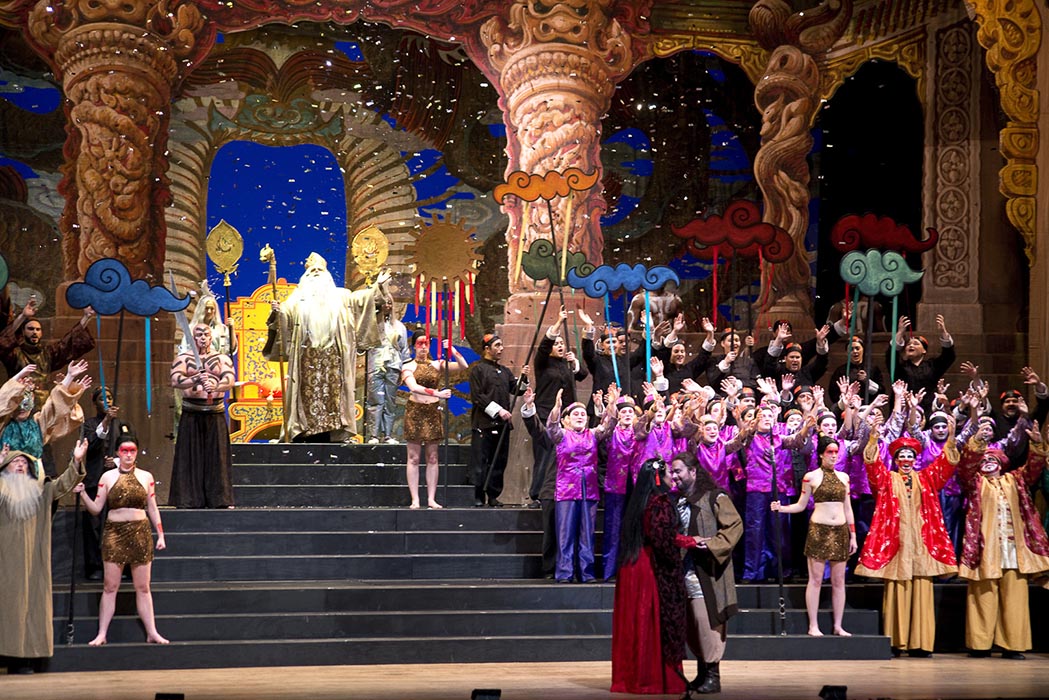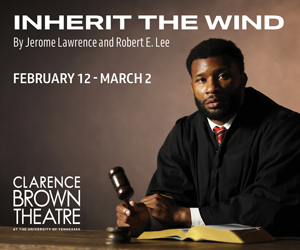It was inevitable that Knoxville Opera would eventually come around again to Giacomo Puccini’s final opera Turandot. Last produced by the company in October 2003, the work virtually cries out for lavish spectacle, given its exotic setting of the Imperial Palace of ancient China and its requirement for a full chorus and a massive assortment of brightly costumed extras in the form of mandarins, palace guards, handmaids, soldiers, and all manner of imperial subjects. This weekend’s KO production of Turandot brought all that to an audience obviously hungry for great voices and great music amidst a superb onslaught of color, pageantry, and sparkle.
A visual spectacle, though, generally requires plenty of stage space. To that end, KO executive director, music director, and conductor Brian Salesky chose the Knoxville Civic Auditorium for Turandot over its usual spot at the Tennessee Theatre so that its larger stage could accommodate the cast and 80 or so chorus members and supernumeraries populating a fairly massive wing-and-drop set of substantial width and depth. Plus, the Civic’s larger orchestra pit can accommodate a more complete complement of instrumentation from the resident Knoxville Symphony Orchestra.
However, despite the Civic’s stage space and seating capacity, poor natural acoustics is one reason the auditorium has found itself underutilized over the last 20 years. In this production of Turandot, even the cast’s strong singers found themselves at the mercy of the hall’s voluminous clarity-robbing environment, with stage director John Hoomes bringing the singers as far downstage as possible for the sake of voice projection and understandable diction.
However, strong voices always find a way, even in difficult roles and difficult situations. Tenor Jonathan Burton, now familiar to the Knoxville audience from previous Knoxville Opera roles in Il Trovatore and Tosca, made the perfect hero figure of Calàf, the suitor prince to the princess Turandot. Burton’s voice has an attractive, engaging clarity—backed up with a surprising range and power—that stands out in a vocal and choral melange, qualities that were quite necessary in this production. His Act III aria, the famous “Nessun dorma,” was splendid— an oh-so satisfying blend of lyrical warmth and poignant emotion.
Soprano Othalie Graham as Princess Turandot brought a big, commanding voice to this difficult role, yet she seemed to be pushing unnecessarily toward brightness, even to the edge of harshness. As Turandot succumbs to love, Graham clearly recognized the need for tempering that vocal edge with softness, a transition that made the character’s resolution feel more natural.

The character of Liù, the slave girl to Calàf’s father Timur, is pivotal for a number of reasons. As history tells us, Puccini died after completing the opera only up through Liù’s torture and tragic suicide, with composer Franco Alfano finishing the score. This left the issue of how to complete the musical transition from the harsh reality of her treatment at the hands of Calàf and Turandot, to the conclusion’s blissful romanticism essentially unresolved. Soprano Yunnie Park, in the role of Liù, was stunningly effective in contrasting the character’s simplicity with a naive, but courageous resolve, giving that transition a credibility. And, Park gave Liù’s final aria “Tanto amore segreto” a gorgeous heartbreaking charm, backed with subtle strength, that earned her a substantial ovation at curtain call.

The court ministers—Ping, Pang, and Pong—certainly have a history of their own as secondary tragi-comedic characters. Recognizing that they must contrast with each other both visually and vocally, yet also perform as an ensemble, Salesky cast three excellent singers: baritone Brandon Hendrickson (Ping), tenor Darius Thomas (Pang), and tenor Andrew Skoog (Pong). The trio found that magical blend of physicality, comedy, and seriousness that makes their ensemble work both as exposition and comic relief.
Bass Raymond Aceto was excellent as Calàf’s father Timur, not only giving the character a fleshed-out depth, but also a welcome vocal solidity. Frequent KO singers Michael A. Rodgers (as a Mandarin) and Harry House (as Altoum) gave their usual vivid dramatic portrayals along with rich vocal performances.
Working with the difficulty of the large stage and the possible inability of hearing the orchestra, the 50 member Knoxville Opera Chorus under chorus master Don Townsend, augmented by a 16 member children’s chorus, deserve kudos for turning the logistics of scale into the art of stage choral music and movement.
Tasked with drenching the set with variety, atmosphere, and colorful pageantry, lighting designer John Horner went even deeper, creating a beautiful icier contrast for Turandot’s entrances that set the character apart.
Knoxville Opera’s Turandot has one more performance Sunday afternoon at 2:30 PM.
And, Knoxville Opera will be revisiting “spectacle” again at the Civic Auditorium in its May production of Verdi’s Aida.






